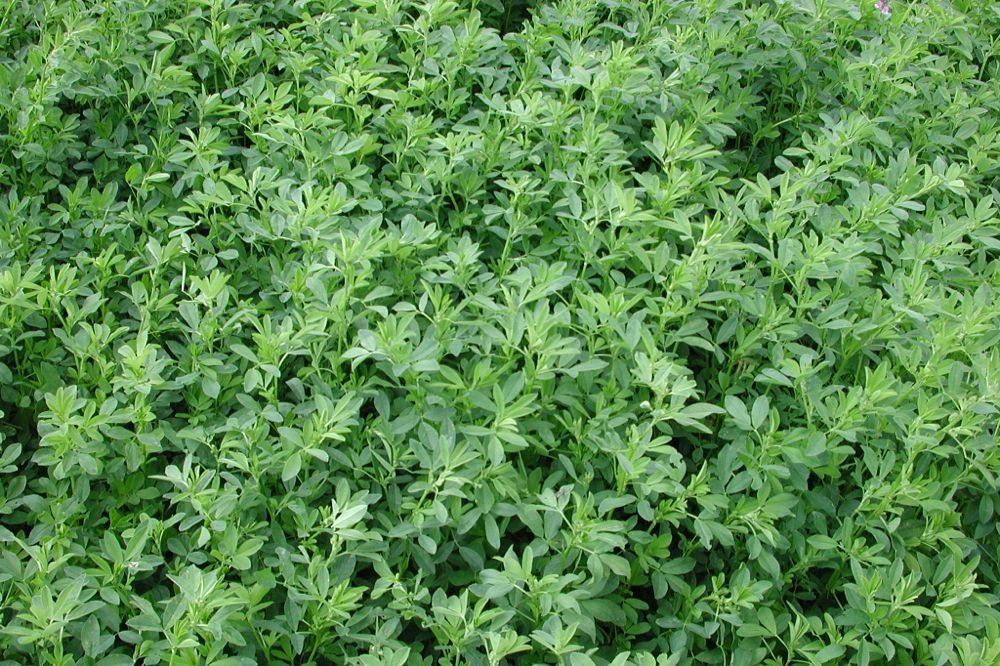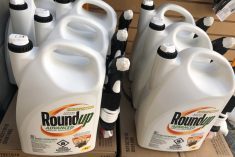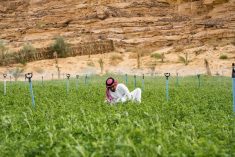The company with Roundup Ready alfalfa on its launchpad plans a limited rollout of commercial seed into Canada’s six eastern provinces this spring.
In a move likely to face opposition from several farm groups across the country, Forage Genetics International (FGI) on Tuesday announced plans for a limited release of commercial HarvXtra alfalfa “in time for spring 2016 planting.”
HarvXtra alfalfa will include Monsanto’s glyphosate-tolerant Roundup Ready genetics plus a trait for lower levels of lignin, a structural component of alfalfa plants that holds them upright but makes them less digestible for dairy and beef cattle.
Read Also

Alberta crop conditions improve: report
Varied precipitation and warm temperatures were generally beneficial for crop development across Alberta during the week ended July 8, according to the latest provincial crop report released July 11.
Seed quantities are expected to be enough for growers to plant a “small, targeted launch” of less than 5,000 acres of hay, FGI said.
Idaho-based FGI stressed its decision is “confined to the sale of seed for hay production” and not for alfalfa seed production. All HarvXtra seed production for the Eastern Canada market will have taken place in the U.S.
Only commercial sales for hay production will be allowed — and the hay can be sold for Canadian domestic use only, the company said.
Sale and planting will only proceed in “limited geographical areas” — specifically, Ontario, Quebec, Nova Scotia, New Brunswick, Prince Edward Island and Newfoundland. There are no plans to commercially offer HarvXtra alfalfa to growers in Western Canada “at this time,” FGI said.
FGI’s move comes as groups opposed to genetically modified (GM) alfalfa’s release in Canada ramp up their campaign, citing a recent report in Alberta Farmer that a batch of foundation seed contaminated with Roundup Ready alfalfa was sent to a forage seed grower in southern Alberta four years ago.
Citing the potential loss of markets, the Alberta Association Of Municipal Districts and Counties this month also passed a resolution urging a halt for any GM alfalfa launch in the province.
“Several alfalfa markets are highly sensitive to GM contamination, including certified organic, seed, pellet and hay exports to Europe, China and Japan, as well domestic seed production and feed for organic livestock and dairy,” National Farmers Union president Jan Slomp said in a letter last Thursday to federal Agriculture Minister Lawrence MacAulay.
Hay-to-hay “coexistence” plans and best management practices have been developed for both the West and East, with the help of the Canadian Seed Trade Association and the forage industry, FGI said.
The updated plans and BMPs for both regions were drawn up in response to requests for further stewardship guidelines, FGI said, “to address the possibility of product moving from Eastern Canada to Western Canada.”
Similar plans have allowed organic, conventional and genetically modified alfalfa farmers to coexist in the U.S., where GM alfalfa has been on the market since 2005, the company said.
But Slomp, in his letter to MacAulay, warned of “widespread GM contamination of conventional alfalfa” in the U.S. “Because of its biological characteristics, it is not possible for GM alfalfa to ‘co-exist’ with conventional alfalfa.”
Canadian regulatory agencies approved unconfined environmental release for the lower-lignin alfalfa trait in October 2014, while HarvXtra alfalfa with the Roundup Ready trait was approved that December.
FGI said that for Canada, it has decided to release alfalfa with the Roundup Ready trait only as part of the HarvXtra package, and won’t be releasing a separate product without the lower-lignin trait.
Genetically modifying alfalfa for lower lignin content, beyond what was possible through conventional breeding, should increase fiber digestibility and change or improve quality as the plant matures, compared to conventional alfalfa at the same stage of maturity, the company said.
Thus, FGI said, HarvXtra “offers more flexibility in cutting schedule to achieve improved forage quality or greater yield potential when compared to conventional alfalfa at the same stage of maturity.”
The NFU’s Slomp, however, said FGI’s variety, by allowing hay harvests at later dates, would increase bloom time “and hence, the unwanted spread of GM traits by cross-pollination.” — AGCanada.com Network















